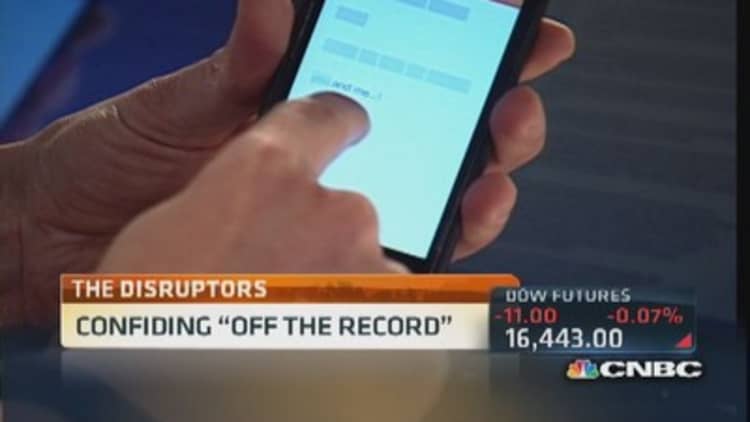Anonymous apps—which allow users to communicate, mostly via smartphones, without revealing their identities—are attracting a ton of (mostly young) users, and no small amount of venture capital money.
But cyberbullying and online threats could scare off users, and subsequently investors, or force the companies to change their business models, say industry analysts.
Unlike social media platforms such as Facebook, anonymous apps such as Yik Yak, Truth and Whisper allow users to keep their identities secret. Whisper, for example, advertises its Apple Store app as "the best place for people to express themselves, connect with like-minded individuals, and discover the unseen world around them."
Read More
Venture capital has already shown interest in the space. Yik Yak completed a funding round of $62 million in late 2014, according to Re/code. Other start-ups such as Wut and Confide have both raised money within the past year and a half.
Read MoreIs Pinterest inching closer to making real money?
But can these businesses survive the harassment and cyberbullying that seem inevitably to follow these platforms? Or will business models have to change?
"Anonymity on a social network invites negative, controversial and even illegal comments, all of which make that platform less attractive to brands," said Kerry O'Shea Gorgone, a lawyer and former university professor specializing in marketing and social media law.
Already there's been some backlash, even in places where these start-ups hope to find future users.
A series of derogatory posts by college students led the College of Idaho to ask Yik Yak to build a geofence around the campus, which would block students on campus from using the app. If Yik Yak doesn't honor the request, the college will ban the app from its network, said college President Marvin Henberg. Yik Yak did not respond to requests for comment.
And the request did not come from authorities. Rather, it came from the college's student body itself, said Henberg.
Professors at Eastern Michigan University have also been victims of verbal abuse from Yik Yak users. Margaret Crouch, professor of philosophy, and other professors were the target of demeaning and sexually explicit conversations on Yik Yak last fall, according to The New York Times.
The specter of being banned from college campuses could be a big problem, since college students are part of these apps' core demographics.
Thus, these start-ups may have to adjust their business models to survive, say analysts, possibly curating or censoring posts, or reducing the level of anonymity.
"The first thing is to make a shift toward transparency. The second thing is to make a move toward content monitoring. They [investors] have to see that your network can survive," said John McCulley, a digital media manager at PR firm Moxley Carmichael.

These apps will likely have to police content on their platform for material that could be considered illegal or harassment. Users may protest such a move, pushing back against restrictions, but eventually the apps will need to provide a broader and cleaner environment, McCulley said.
"They will have to monitor content if they want to be widely accepted by universities and businesses," said McCulley.
Read MoreThis is the most-used emoji on Instagram
Being honest with users about what the companies do with their information also helps, said McCulley. Yik Yak, which doesn't collect names and contact information, will disclose IP address and other device information, according to the company's privacy policy. Other apps, like Wut and Confide, store some personal contact information, such as names and email addresses.
Read MoreInside Facebook's futuristic new headquarters
And what if companies don't adjust? The shutdown of app Secret could serve as a warning.
In April, the co-founder of Secret, David Byttow, announced that the app would be shutting down because Secret didn't represent the vision he had when he started the company. The company had been launched 16 months prior, but struggled with hate speech, bullying and threats.
"This was an app that had very successful founding but couldn't adapt," said McCulley.

